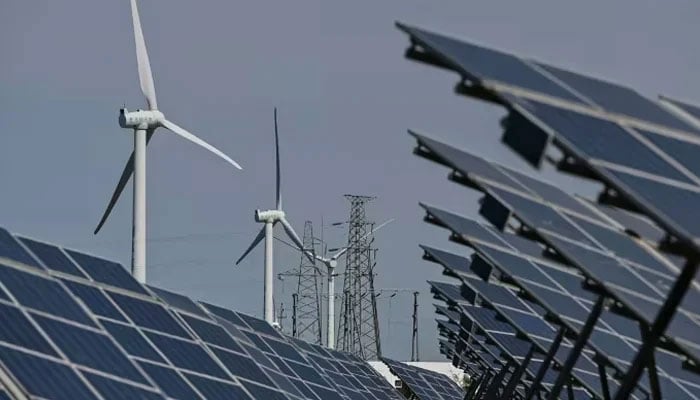Country urged to adopt renewable energy to fight climate change impacts
Pakistan need to shift towards renewable energy sources urgently to cope with environmental challenges occurring due to climate change.
This was urged by experts during a webinar titled “Renewable Energy: Pursuing Clean Energy Solutions for Pakistan”, organised by Global Neighbourhood for Media Innovation in collaboration with the United States Department of State.
The online moot discussed the role of renewable energy in combating climate change as Pakistan is still majorly dependent on fossil fuels for the daily operation.
The speakers highlighted the use of renewable energy in mitigating climate change, reducing carbon footprints, and charting a course toward energy autonomy.
The event was moderated by environmental journalist Afia Salam. She emphasized the media’s role in disseminating climate change awareness.
Salam presented a view of the environmental issues, stressing that policymakers must adopt cohesive strategies within the Pakistani context.
Providing insights into Pakistan’s energy generation portfolio, Zehra Aneek, an expert on energy sustainability and corporate governance, said that the country heavily relied on fossil fuels, which account for 60 percent of total energy consumption.
She elucidated the challenges in infrastructure development for renewable energy transmission and installation by citing policy barriers such as the “solar tax”, which disincentivizes the adoption of renewable energy sources to the public.
Echoing these sentiments, Mohsin Babbar, a media person, shed light on the economic repercussions of Pakistan’s energy import bills and circular debt. He emphasized the need for broadening the climate change discourse beyond urban elites to engage local communities actively.
Babbar highlighted the role of political parties, media, and digital influencers in promoting awareness and advocacy for renewable energy solutions.
Nida Farid, an aerospace engineer, said that it was important to educate the public about energy conservation in reducing utility bills and promoting energy-efficient appliances.
She underlined the necessity of dispelling misconceptions surrounding energy among policymakers to facilitate effective decision-making.
The webinar emphasized the necessity of policy frameworks that support renewable energy adoption without acting as barriers.
The discussion highlighted solar energy as a viable solution for mitigating climate change consequences and called for collective action towards a cleaner, safer environment for future generations.
-
 Alexandra Daddario, Andrew Form Part Ways After 3 Years Of Marriage
Alexandra Daddario, Andrew Form Part Ways After 3 Years Of Marriage -
 Eric Dane Rejected Sex Symbol Label
Eric Dane Rejected Sex Symbol Label -
 Avan Jogia Says Life With Fiancee Halsey Feels Like 'coming Home'
Avan Jogia Says Life With Fiancee Halsey Feels Like 'coming Home' -
 Kate Middleton's Role In Handling Prince William And Harry Feud Revealed
Kate Middleton's Role In Handling Prince William And Harry Feud Revealed -
 Tucker Carlson Says Passport Seized, Staff Member Questioned At Israel Airport
Tucker Carlson Says Passport Seized, Staff Member Questioned At Israel Airport -
 Taylor Swift Made Sure Jodie Turner-Smith's Little Girl Had A Special Day On 'Opalite' Music Video Set
Taylor Swift Made Sure Jodie Turner-Smith's Little Girl Had A Special Day On 'Opalite' Music Video Set -
 Eric Dane Says Touching Goodbye To Daughters Billie And Georgia In New Netflix Documentary
Eric Dane Says Touching Goodbye To Daughters Billie And Georgia In New Netflix Documentary -
 Channing Tatum Reveals What He Told Daughter After Violent Incident At School
Channing Tatum Reveals What He Told Daughter After Violent Incident At School -
 King Charles Lands In The Line Of Fire Because Of Andrew Mountbatten-Windsor
King Charles Lands In The Line Of Fire Because Of Andrew Mountbatten-Windsor -
 Denise Richards Doubles Down On Abuse Claims Against Ex Husband Aaron Phypers Amid Show Return
Denise Richards Doubles Down On Abuse Claims Against Ex Husband Aaron Phypers Amid Show Return -
 Russia Set To Block Overseas Crypto Exchanges In Sweeping Crackdown
Russia Set To Block Overseas Crypto Exchanges In Sweeping Crackdown -
 Gwyneth Paltrow Reveals Deep Personal Connection With Kate Hudson
Gwyneth Paltrow Reveals Deep Personal Connection With Kate Hudson -
 Prince Harry, Meghan Markle’s Game Plan For Beatrice, Eugenie: ‘Extra Popcorn For This Disaster’
Prince Harry, Meghan Markle’s Game Plan For Beatrice, Eugenie: ‘Extra Popcorn For This Disaster’ -
 OpenAI To Rollout AI Powered Smart Speakers By 2027
OpenAI To Rollout AI Powered Smart Speakers By 2027 -
 Is Dakota Johnsons Dating Younger Pop Star After Breakup With Coldplay Frontman Chris Martin?
Is Dakota Johnsons Dating Younger Pop Star After Breakup With Coldplay Frontman Chris Martin? -
 Hilary Duff Tears Up Talking About Estranged Sister Haylie Duff
Hilary Duff Tears Up Talking About Estranged Sister Haylie Duff




